#henry livermore abbott
Text
Civil War Favorites As Ghosts
Alonzo Cushing
lonzo is like a really cute ghost ok he plays with his brother and plays pranks on people with will
William Cushing
he is the type of ghost to smack people in the bum and get a jolly good laugh from it
Joshua Lawrence Chamberlain
LaWrEnCe is a ghost in bowdoin that shows up to tell kids to get to their lectures if anyone is late oh and if they get brave and talk back he flies through them and they either go to class or leave with a new mental scar its fine dudes maybe its both what do i know
Thomas Chamberlain
he is uh a really sad ghost, he regrets the way he died but he also is happy he died, so he cannot exactly move onward in the after-life so he haunts the battlefields he has gone to, and his old homes in maine
Ellis Spear
ok he is really salty maybe ?? he sits at little round top like, “ugh” and just stays there or is in bowdoin and maybe made up with lawrence and they scare kids together as a joke
Francis William Bartlett
wait ok i got the perfect one he is a one legged ghost and when you hear one leg dragging and one foot step everyone gets fearful but then theres more
when he appears he is just a prosthetic leg (he can appear fully and knows it) but being a prosthetic leg gets the best reactions, especially if he wants to kick a person
Henry Livermore Abbott
he mocks you. Nothing else, he sits by with Oliver probably, and mocks you while Oliver sits there like, “ok but-”
Oliver Wendell Holmes Jr
ok he is the ghost that misplaces your items and watches you look and hes like, “hA” and then sometimes he actually tries to help but most of the time hes like lol ima mess with this fool
Edward Needles Hallowell
he slaps racist people as a ghost. He probably goes into kkk meeting and ruins things on purpose because wE LOVE A QUAKER ABOLITIONIST!
Robert Gould Shaw
actual angel. He resides in a home and will help you with things, can’t find your keys? woah there they are!
#Alonzo Cushing#William Cushing#JLC#joshua lawrence chamberlain#joshua l chamberlain#thomas chamberlain#tom chamberlain#edward needles hallowell#ned hallowell#francis william bartlett#henry livermore abbott#Henry l abbott#oliver wendell holmes jr#Robert Gould Shaw#American Civil War#ACW#historical shitposting#i am funny right?#20th mass#20th maine#20th massachusetts
20 notes
·
View notes
Text
THE BIG STREET
August 13, 1942
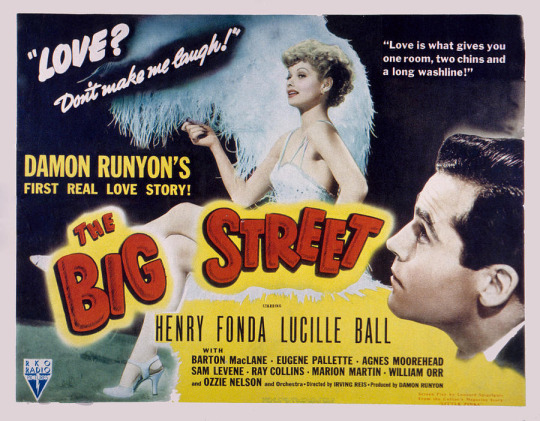
Producer: Damon Runyon
Director: Irving Reis
Screenplay: Leonard Spigelgass, based on the short story “Little Pinks” by Damon Runyon, first published in Collier’s magazine.
Dance Staging: Chester Hale
Gowns: Renie
Miss Ball’s Dancing Costume: Freddy Wittop
Miss Ball’s Make-Up: Perc Westmore
The film is sometimes referred to as Damon Runyon’s The Big Street.
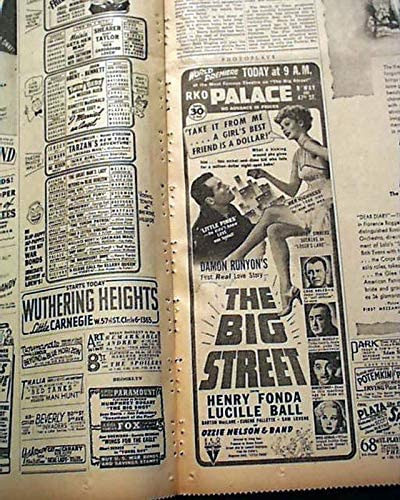
The film premiered in New York City at the RKO Palace on August 13, 1942. That same day Disney’s long-awaited Bambi opened at Radio City Music Hall. At the Capitol, Orson Welles’ The Magnificent Ambersons, also starring Agnes Moorehead and Gil Perkins, continued its run. Nearby, at the Albee, a second-run cinema, Top Hat (1935) starring Ginger Rogers and Lucille Ball was playing. The Big Street opened nationally September 4, 1942.
“Love is something that gets you one room, two chins, and three kids.” ~ Gloria Lyons (Lucille Ball)
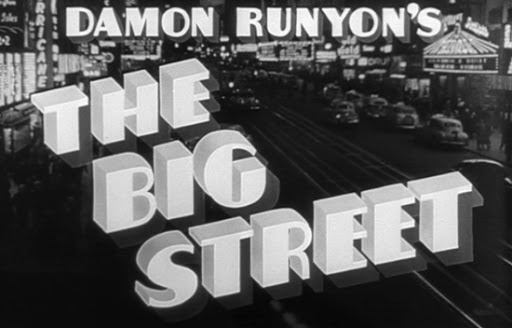
PRINCIPAL CAST
Lucille Ball (Gloria Lyons aka ‘Her Highness’) was born on August 6, 1911 in Jamestown, New York. She began her screen career in 1933 and was known in Hollywood as ‘Queen of the B’s’ due to her many appearances in ‘B’ movies. With Richard Denning, she starred in a radio program titled “My Favorite Husband” which eventually led to the creation of “I Love Lucy,” a television situation comedy in which she co-starred with her real-life husband, Latin bandleader Desi Arnaz. The program was phenomenally successful, allowing the couple to purchase what was once RKO Studios, re-naming it Desilu. When the show ended in 1960 (in an hour-long format known as “The Lucy-Desi Comedy Hour”) so did Lucy and Desi’s marriage. In 1962, hoping to keep Desilu financially solvent, Lucy returned to the sitcom format with “The Lucy Show,” which lasted six seasons. She followed that with a similar sitcom “Here’s Lucy” co-starring with her real-life children, Lucie and Desi Jr., as well as Gale Gordon, who had joined the cast of “The Lucy Show” during season two. Before her death in 1989, Lucy made one more attempt at a sitcom with “Life With Lucy,” also with Gordon.
Gloria’s singing voice was provided by Martha Mears, who also did Ball’s singing in DuBarry Was a Lady (1944).
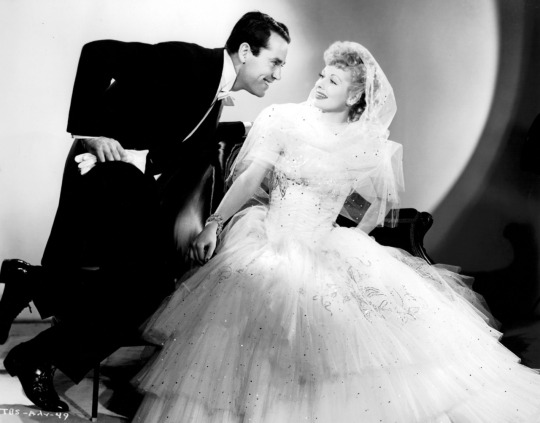
Henry Fonda (Augustus Pinkerton II aka ‘Little Pinks’) first worked with Lucille Ball in the 1935 film I Dream Too Much. When Lucille Ball first got to Hollywood, the two actually briefly dated. They collaborated on the TV special “The Good Years” (1962) and the film Yours, Mine and Ours (1968). During the 1970s, Fonda and Ball often turned up on the same awards and tribute shows. Fonda was nominated for three Oscars, winning in 1982 for On Golden Pond. He also won an honorary Oscar in 1981. Fonda died in 1982 at age 77.
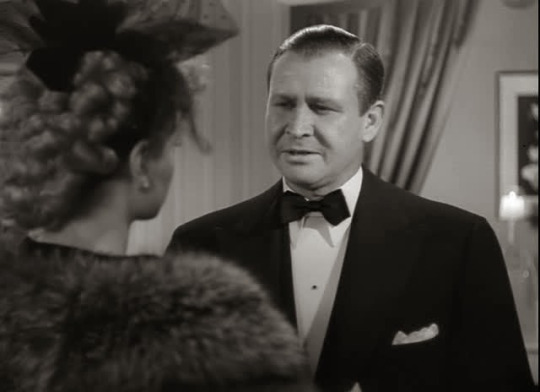
Barton MacLane (Case Ables) was seen in the film The Maltese Falcon (1941) but is probably best remembered for his final role, the blustery General Peterson on “I Dream of Jeannie” (1965-69).
“A fat man’s always listening to love stories, but he’s never go any to tell.” ~ Nicely Nicely Johnson
Eugene Pallette (Nicely Nicely Johnson, The Greatest Eater Alive) was seen as Friar Tuck in Robin Hood (1938) and in Mr. Smith Goes To Washington (1939).
The character of Nicely Nicely Johnson was played by Stubby Kaye, who reprised the role he played on Broadway, in the film version of Runyon’s Guys and Dolls (1955). He was so named because his usual reply to the question “How are you doing?” was typically “Nicely nicely, thank you!”
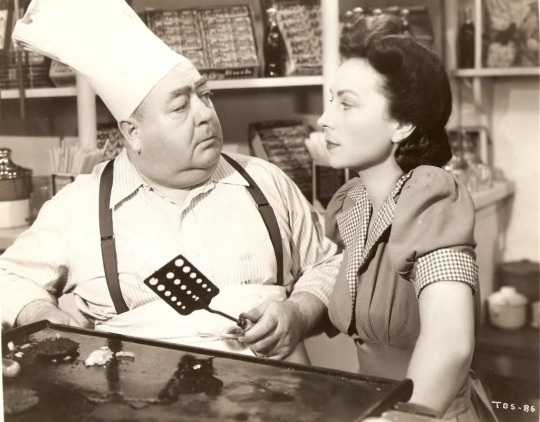
Agnes Moorehead (Violette Shumberg) was a classically trained performer who collaborated with Orson Welles on Citizen Kane (1941) and The Magnificent Ambersons (1942). She is best remembered as Samantha’s exotic mother Endora on the TV series “Bewitched” (1964-72).
Violette weighs 100 pounds, four ounces.
“She has a very large capacity for groceries.” ~ Pinks (about Violette)

Sam Levene (Horsethief) originated the role of Nathan Detroit in the Broadway stage musical of Runyon’s Guys and Dolls. Singing great Frank Sinatra played Nathan Detroit in the movie version in 1955.
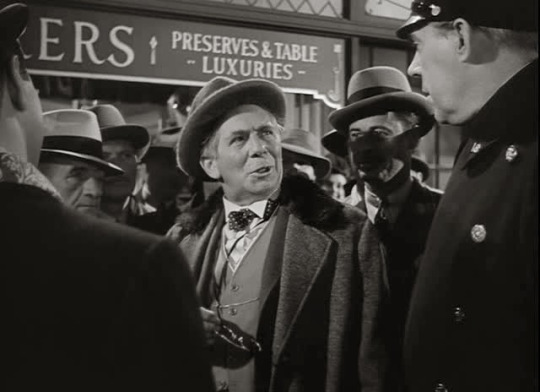
Ray Collins (Professor B) also collaborated with Orson Welles on Citizen Kane (1941) and The Magnificent Ambersons (1942), along with Agnes Moorehead. He is best remembered for playing Lieutenant Tragg on “Perry Mason” from 1957 to 1965.
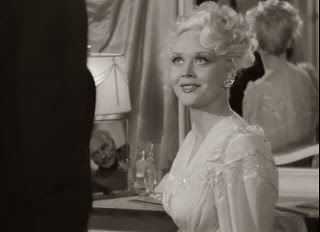
Marion Martin (Mimi Venus) would also be seen with Lucille Ball in Abbott and Costello in Hollywood (1945). Although she was often cast as a brassy stripper, showgirl or tough gun moll, off screen she was known to be extremely shy and retiring.
“That dame is a lump of mud!” ~Gloria (about Mimi)

William Orr (Decatur Reed) was an actor turned executive. As the head of WB Television for nine years, he was executive producer of the studio's early forays into the medium, helping to put ABC on the prime-time map with a steady staple of westerns and detective shows. In 1959 he received a Golden Globe for his contributions to television.
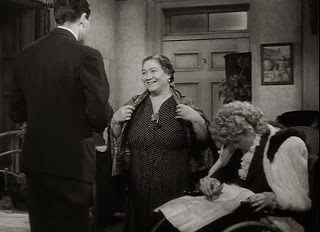
Vera Gordon (Mrs. Lefkowitz) emigrated with her family from Russia when she was seven years old. She became involved in the theatre and was active in silent films and early talkies. She had previously appeared with Lucille Ball in 1938′s Having Wonderful Time.

George Cleveland (Col. Venus) makes his fourth film appearance with Lucille Ball. In 1949 they also did Miss Grant Takes Richmond. He is best remembered for playing Gramps on “Lassie” (1954-57).

Ozzie Nelson (Himself) was considered the pre-eminent TV dad of the 1950s thanks to his successful family sitcom “The Adventures of Ozzie and Harriet” (1952-66). Before TV fame, he was a bandleader with his wife Harriet the lead singer. Nelson later appeared on several talk shows with Lucille Ball.
UNCREDITED CAST (with connections to Lucille Ball)
Baby (Gloria’s Pekingese Dog)

Louise Beavers (Ruby, Gloria’s Maid) went on to appear in three more films with Lucille Ball: DuBarry Was a Lady (1943), Lover Come Back (1946), and The Facts of Life (1960).
Charles Cane (McCarty, Holland Tunnel Policeman) also appeared with Lucille Ball in The Dark Corner (1946) and as one of the theatre patrons at “Over The Teacups” in “Ethel’s Birthday” (1954) which also featured Big Street extras Bess Flowers, James Conaty, Sam Harris, and Harold Miller.
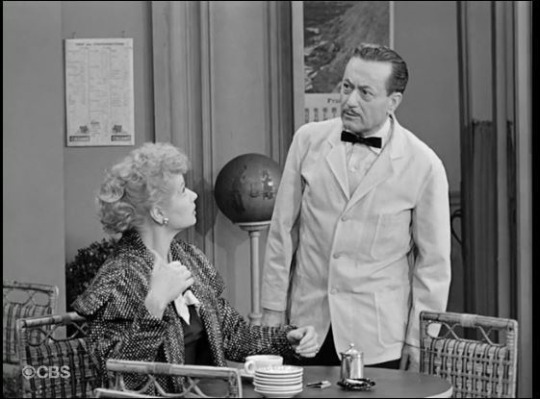
Jack Chefe was seen as a Paris waiter in “Lucy Meets Charles Boyer” (ILL S5;E19) and played a bellhop in “Lucy and John Wayne” (ILL S5;E2) and had also appeared in five films with Lucille Ball, including playing a waiter in Forever, Darling. Of Chefe’s 358 film roles, 165 were waiters!
James Conaty (Nightclub Patron) was also seen with Lucille in I Dreamed Too Much (1935), Lured (1947), and The Long Long Trailer (1953). He was one of the theatre patrons at “Over The Teacups” in “Ethel’s Birthday” (1954) which also featured Big Street extras Bess Flowers, Charles Cane, Sam Harris, and Harold Miller.
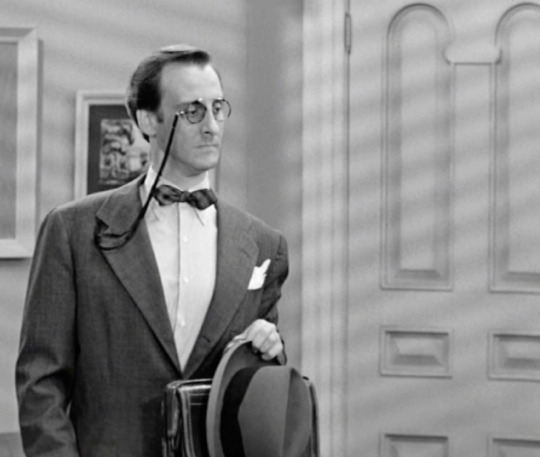
Hans Conried (Waiter) played Harry Martin in “Redecorating” (ILL S2;E8) and Percy Livermore in “Lucy Hires an English Tutor” (ILL S2;E13), both in 1952. He also did two episodes of “The Lucy Show,” both as her music tutor Dr. Gitterman in 1963.
Pedro de Cordoba (Doctor) was also seen with Lucille Ball in Five Came Back (1939).
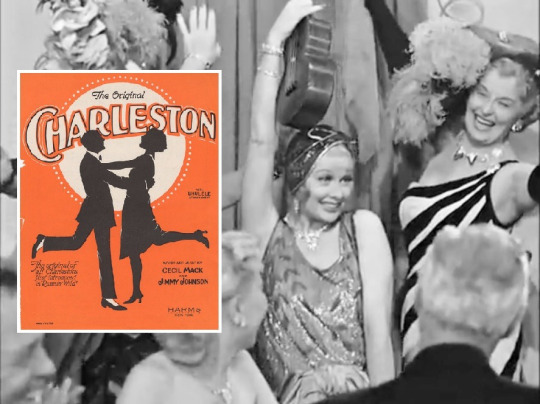
Helen Dickson (Florida Club Patron) had appeared with Lucille Ball in Carnival (1935) and Two Smart People (1946). She was one of the aging flapper showgirls in “Ricky Loses His Voice” (ILL S2;E9) in 1952.
Jimmy Dime (Truck Driver / Stunts) was seen with Lucille Ball in 1951′s The Magic Carpet. He did a half dozen episodes as a background players on Desilu’s “The Untouchables” (1959-61).
Eddie Dunn (Mulvaney) was also part of Ziegfeld Follies (1945) featuring Lucille Ball.
Jay Eaton (Late Night New York Nightclub Patron) did a total of nine films with Lucille Ball between 1934 and 1949, including her other Damon Runyon film Sorrowful Jones (1949).
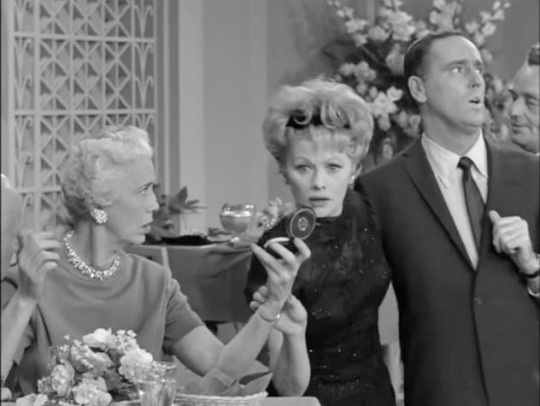
Bess Flowers (Florida Nightclub Patron) aka 'Queen of the Extras’ made numerous uncredited background appearances on both “I Love Lucy” and “The Lucy Show.” She holds the record of the most film collaborations with Lucille Ball: 17.
Karen X. Gaylord (Florida Club Patron) was also part of Ziegfeld Follies (1945) featuring Lucille Ball.
Charlie Hall (Caviar Waiter) also did Kid Millions with Lucille Ball and went on to do four more films with her until 1942.
William Halligan (Detective) was also with Lucille Ball in 1940′s You Can’t Fool Your Wife.
Art Hamburger (Joe Duffle, Eating Contest Opponent) makes his final of three screen appearances. He became an associate director. This is his only time working with Lucille Ball.
Joe Duffle is from Boston and weighs 337 and a half pounds. There is some irony that Nicely Nicely (then Violette’s) eating contest opponent is actually named Hamburger.
Mary Halsey (Showgirl) also did Seven Days Leave with Lucille Ball in 1942.
Sam Harris (Passerby on Florida Boardwalk) was in the background of a dozen Lucille Ball films, as well as being seen on “I Love Lucy,” “The Lucy-Desi Comedy Hour” and “The Lucy Show.” He was one of the theatre patrons at “Over The Teacups” in “Ethel’s Birthday” (1954) which also featured Big Street extras Bess Flowers, Charles Cane, James Conaty, and Harold Miller.
Jack Herrick (Mindy’s Customer) was also seen with Lucille Ball in The Bowery (1933).
John Indrisano (Mug at Mindy's) was also seen with Lucille Ball in The Facts of Life (1960).
Tiny Jones (Small Friendly Neighbor) was seen with Lucille Ball in A Girl, A Guy, and a Gob (1934) and Five Came Back (1939).
Donald Kerr (Pete the Passer) appeared in eight films with Lucille Ball between 1936 and 1954.
Wilbur Mack (Florida Club Patron) appeared in three more films with Lucille Ball: Thousands Cheer (1943), Ziegfeld Follies (1945), and Lured (1947).
George Magrill (Mug at Mindy's / Stunts) appeared with Lucille Ball in ten films between 1933 and 1949.
Richard Martin also did Seven Days Leave with Lucille Ball in 1942
Tony Merlo (Mug at Mindy's) was also seen with Lucille Ball in Dance, Girl, Dance (1940) and Broadway Bill (1934).
John ‘Skins’ Miller (Truck Driver) was also with Lucille Ball in Fancy Pants (1950) and Sorrowful Jones (1949).
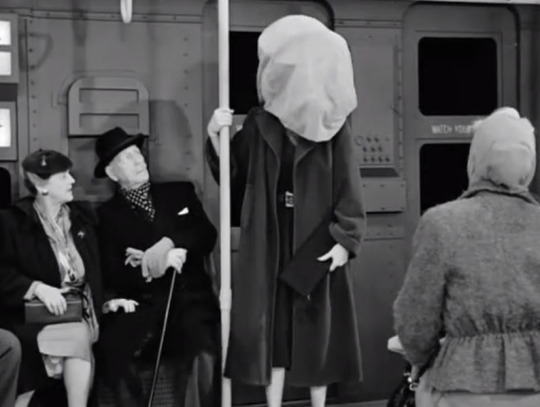
Harold Miller (Florida Club Patron) shares 13 film credits with Lucille Ball. He was one of the theatre patrons at “Over The Teacups” in “Ethel’s Birthday” (1954) which also featured Big Street extras Bess Flowers, Charles Cane, James Conaty, and Harold Miller. Harris would return for “Lucy and the Loving Cup” (S6;E12) as a subway strap hanger. He appeared in six episodes of “The Lucy Show,” the last one being as a party guest on “My Fair Lucy” (1965).
Bert Moorhouse (Florida Club Waiter) did nine films with Lucille Ball from 1933 to 1954.
Frank Moran (Mug at Mindy’s) makes his final of five film appearances with Lucille Ball.
George Noisome (Newsboy) also appeared with Lucille Ball in That’s Right, You’re Wrong (1939).
Barry Norton (Florida Club Patron) was also seen with Lucille Ball in Nana (1934) and Dance, Girl, Dance (1940).
Frank O’Connor (Police Captain at Holland Tunnel) did nine films with Lucille Ball from 1933 to 1946.
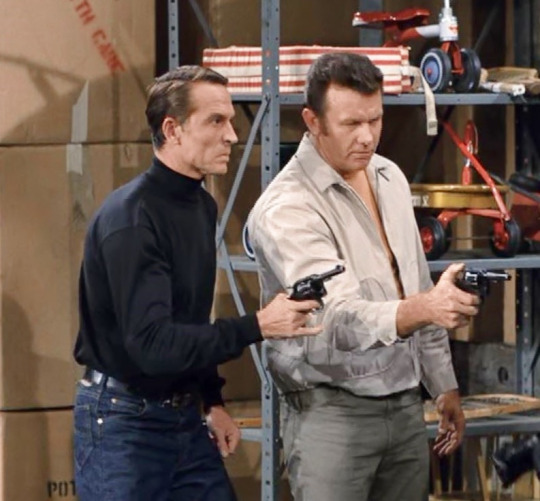
Gil Perkins (Mug / Stunts) was aboard the train when Lucy and Ricky headed home from California in “The Great Train Robbery” (ILL S5;E5). He was seen in The Fuller Brush Girl (1950) with Lucille Ball. He made one appearance on “Here’s Lucy” (above right) in 1970.
Bob Perry (Toupee, Associate of Ables / Stunts) was also seen with Lucille Ball in Stage Door (1937) and Joy of Living (1938).
Ralph Peters (Florist) was also with Lucille Ball in Sorrowful Jones (1949).
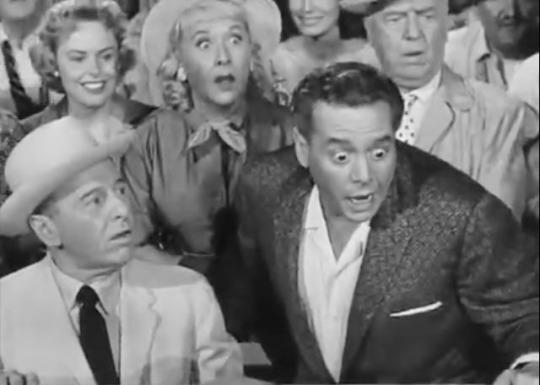
Addison Richards (Dr. Mitchell) played the American Consul in “Lucy Goes To Mexico” (LDCH 1959) as well as three other films with Lucille Ball.
Dewey Robinson (Truck Driver) did five other films with Lucille Ball.
Shimen Ruskin (Waiter Captain at Florida Club) was previously seen with Lucille Ball in Having Wonderful Time (1938) but is best remembered as Mordcha in the film Fiddler on the Roof (1971).
Hector V. Sarno (Friendly Neighbor) was also with Lucille Ball in Muss ‘em Up (1936).
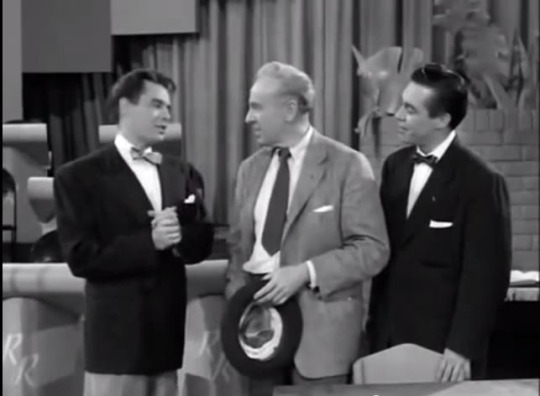
Harry Shannon (Florida Doctor) was seen with Lucille Ball and Desi Arnaz in Too Many Girls (1940). He played Jim White (above center), photographer in “Men Are Messy” (ILL S1;E8) in 1951. He is probably best remembered as the father of Rose (Rosalind Russell) in Gypsy (1962).
Walter Soderling (Doctor at Mindy’s) was with Lucille Ball in Easy To Wed (1946).
Mary Stuart (Showgirl) was also seen with Lucille Ball in Seven Days Leave (1942). She is best remembered for her four decade run as Mary on “Search for Tomorrow”.
Elliott Sullivan (Tramp) was also in That’s Right, You’re Wrong (1939) and Next Time I Marry (1938) with Lucille Ball.
Harry Wilson (Fethington) did four other films with Lucille Ball between 1934 and 1950. He was also an extra on Desilu’s “Untouchables” (1959-62).
Marie Windsor (Florida Club Patron) was also in Critic’s Choice (1963) with Lucille Ball.
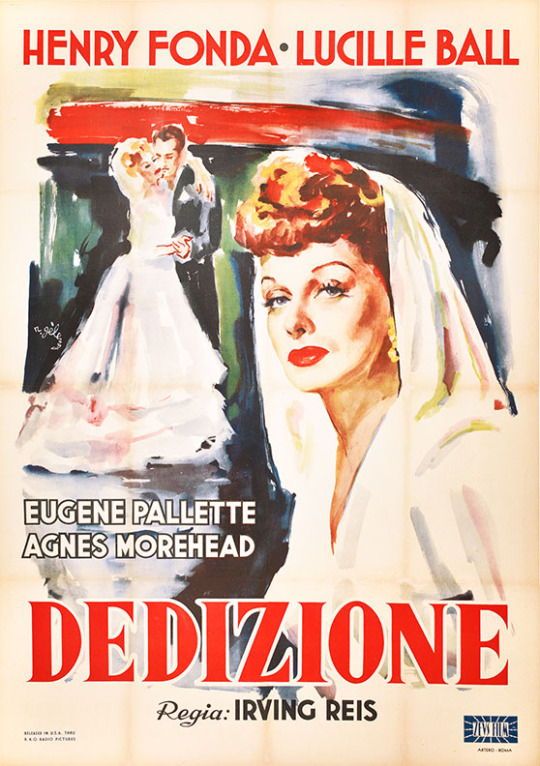
BIG STREET OPENING
"Loser's Lane - the sidewalk in front of Mindy's Restaurant on Broadway - is not as high-toned a trading center as Wall Street, but the brokers are a lot more colorful. Generally they prefer to put their money on a prizefight or horse race, but when the action slows, anything can happen and it usually does. Tonight, for example, the citizens of the Lane are discussing the latest contest in their usual quiet way..."
BIG STREET TRIVIA
The Big Street was a nickname for Broadway, where this movie's plot starts, and where all Runyon's stories take place. The film opens at West 50th and Broadway in New York City, with the marquee of the Capitol Theatre in the background.
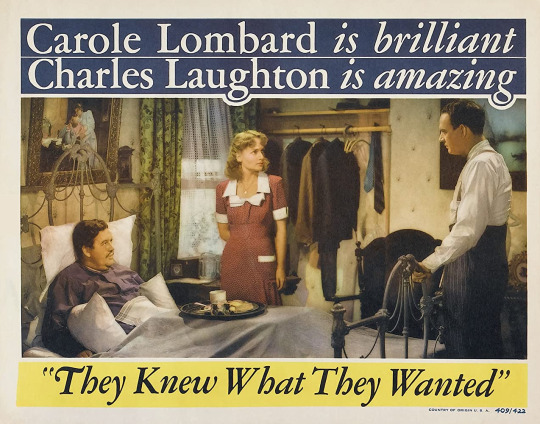
Damon Runyon originally wanted to cast Charles Laughton and Carole Lombard in the lead roles, but neither one was interested in the project. The two had previously paired on White Women (1933) and They Knew What They Wanted (1940), Lombard suggested the producer consider her friend Lucille Ball and, despite pressure by RKO to hire a better-known actress, Runyon offered her the role. Unaccustomed to playing series roles, Lucille asked advice from Laughton on how to approach such a difficult part. Laughton told her not to hold back: “If you are going to play a bitch, play a bitch!”
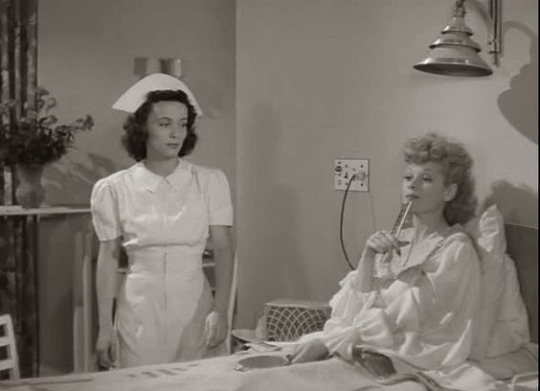
Ball later recalled that at the time she was cast, "nothing much seemed to be happening for me at the studio. My $1000 weekly paycheck came regularly, but I was still a regular among the Bs."
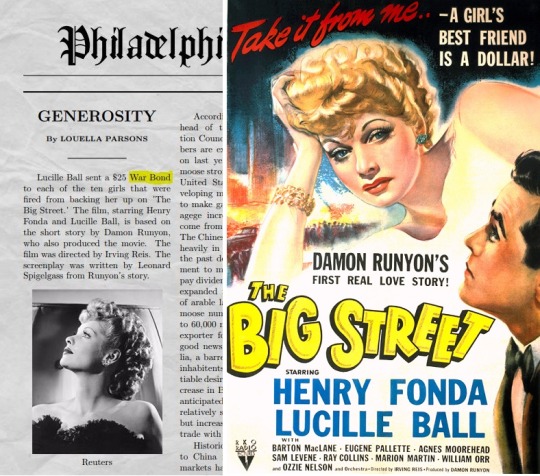
Philadelphia Daily News ~ June 6, 1942
Reports that Lucille Ball sent a $25 War Bond to each of the ten girls that were fired from backing her up on “The Big Street”.
During filming, Lucy’s new husband Desi Arnaz felt so insecure about leaving Lucy and Fonda alone together that he’d often pop by the set to keep an eye on them. His paranoia so exasperated director Irving Reis that he finally banned him from the set.
This was Lucille Ball’s favorite of her nearly 80 films. She felt her performance was unjustly ignored by the Academy.
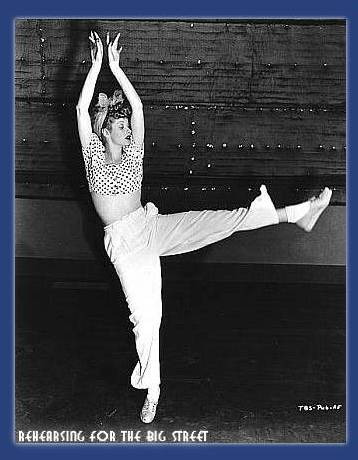
The vocals for "Who Knows?" by Harry Revel and Mort Greene, performed by Gloria in Case's Manhattan club, were provided by Martha Mears. The character later reprises the song with Ozzie Nelson and his orchestra in the Miami nightspot.
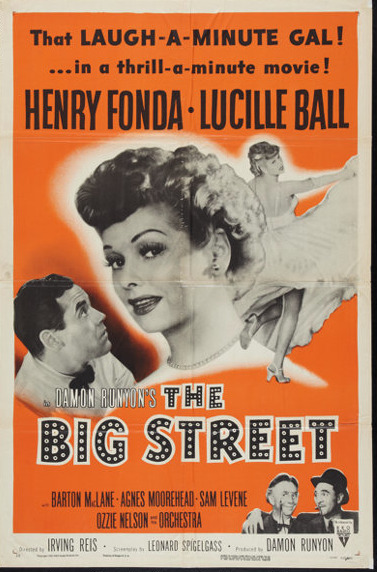
The film was re-released in 1955, at the height of Lucille Ball’s television success. Although Fonda remains first billed, Ball’s photo clearly indicates that she is the drawing card.
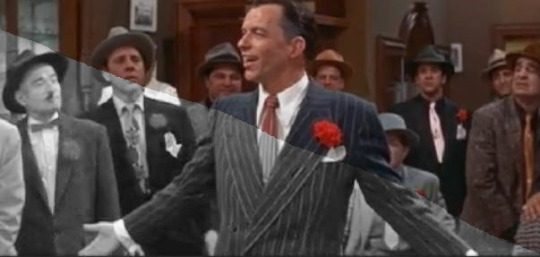
Damon Runyon also created the source material for the hit Broadway musical Guys and Dolls (1950), which starred Robert Alda, who went on to make several appearances on “The Lucy Show.” The two stories share the character of Nicely Nicely Johnson. When the film version was made by MGM in 1955, Lucy and Desi were also under contract to the studio. A brief clip of the film was inserted into the middle of an episode of “I Love Lucy” called “Lucy and the Dummy” (S5;E3), although the clip was removed after its initial airing. Further, when Lucille Ball first came to Hollywood, before becoming a contract player at RKO, she worked for Sam Goldwyn as one of the Goldwyn Girls. In Guys and Dolls, the Hot Box Girls are played by the Goldwyn Girls.
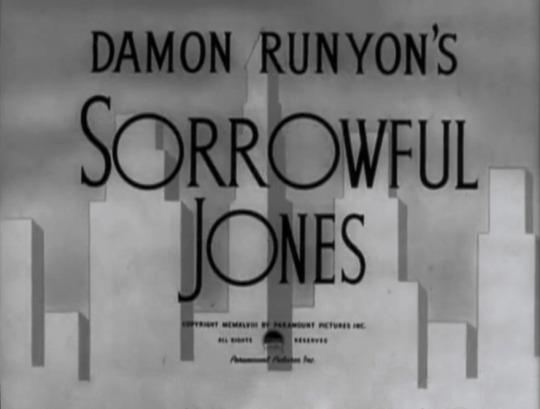
In 1949, Lucille Ball starred in another film based on a Damon Runyon story, Sorrowful Jones, a remake of the 1934 Shirley Temple film, Little Miss Marker.
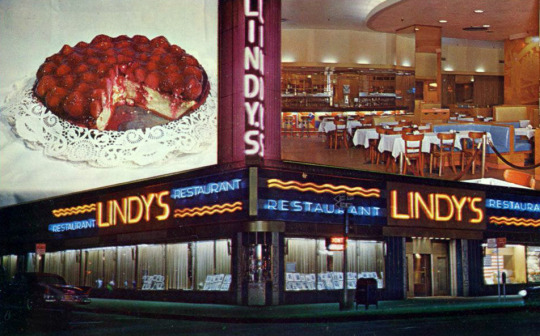
Damon Runyon was a big fan of Lindy’s, a Manhattan restaurant famous for their cheesecake, and wrote the eatery into his books as Mindy's. The musical Guys and Dolls, based on Runyon's writings, immortalizes Lindy's in one of its songs. In “Ricky’s Contract” (ILL S4;E10), Lucy tells Fred and Ethel that Ricky took his entire band to Lindy’s to celebrate learning that he had been offered a movie contract.
In The Big Street, a sympathetic Pinks decides to take Gloria to Florida to recuperate - by pushing her wheelchair the entire way - starting with the Holland Tunnel! Although Lucy and Fonda never left Hollywood, the locations are achieved by rear projection and establishing footage.
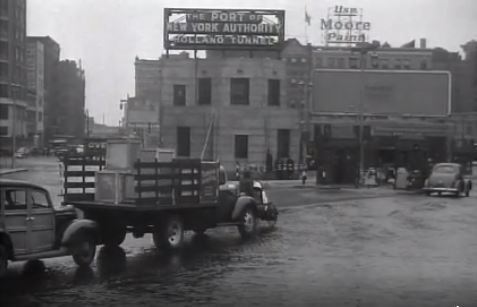
The Holland Tunnel figures into “I Love Lucy,” not once - but twice. In “The Marriage License” (ILL S ), after finding out that her marriage license may be invalid, Lucy goes on a twelve hour walk to East Orange, New Jersey. “How I ever got through the Holland Tunnel, I don’t know.”

The Holland Tunnel will be mentioned again three years later in “Lucy Learns to Drive” (ILL S4;E11). Reportedly, she tried to make a u-turn in the Holland Tunnel resulting in traffic being tied up to East Orange, New Jersey.
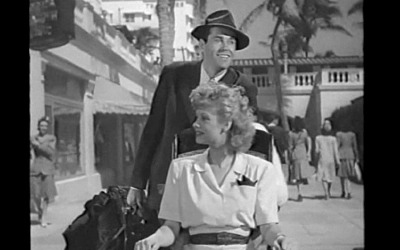
Action is also set in Miami Beach, Florida. Pinks and Gloria hitchhike there to visit with Nicely Nicely and Violette who are operating a night spot there.
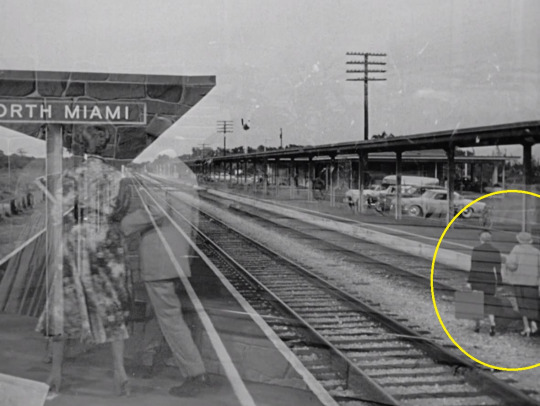
In “Off To Florida” (ILL S6;E6), Lucy and Ethel also hitchhike to Miami Beach Florida after being left on the side of the road by their ride share, a suspected hatchet murderess. They arrive at the North Miami train station covered in chicken feathers from riding in the back of a poultry truck.
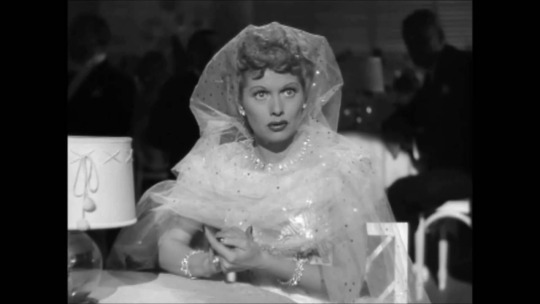
Doting Pinks has a pet name for haughty Gloria: 'Your Highness'. In Florida, her friends conspire to get people to come and hear her sing by fibbing that she is the Princess of Corolia, a fictional place.

In “The Publicity Agent” (ILL S1;E31), Lucy conspires to get Ricky more publicity by pretending to be a fawning fan of royal blood: ‘The Maharincess of Franistan’!
FAST FORWARD!
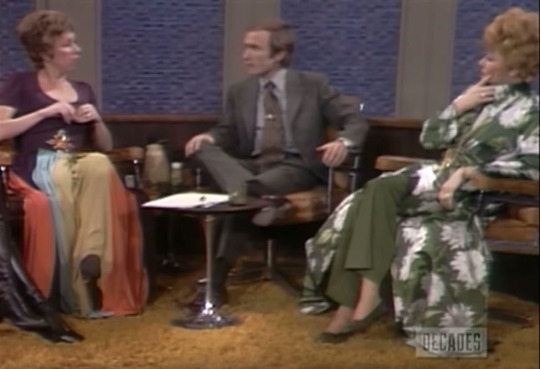
On a 1971 episode of “The Dick Cavett Show" with guests Lucille Ball, Carol Burnett, and Lucie Arnaz, Lucie compliments her mother's dramatic performance in the film.
The film is referenced in the television film Lucy & Desi: Before the Laughter (1991)
A poster for the film is on Lucy’s dressing room wall in Lucy, a 2003 TV movie.
The Big Street turns up in the TV listings in the low budget film Hollywood Mouth (2008) starring Joe Bologna.
A clip from the film is featured in a montage during “AFI Life Achievement Award: A Tribute to Henry Fonda” a 1978 special attended by Lucille Ball.
Henry Fonda: The Man and His Movies (1982) contains dressing room and dance floor scenes with Lucille Ball.
The Emmy-winning documentary Lucy and Desi: A Home Movie (1993) features a brief clip from the movie.
When Cher is TCM Guest Programmer in 2011, she selects The Big Street as one of her films to be aired.
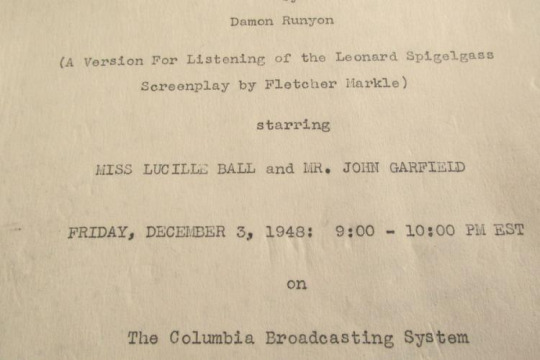
In December 1948, Lucille Ball reprised her role on radio with John Garfield taking the role of Pinks.
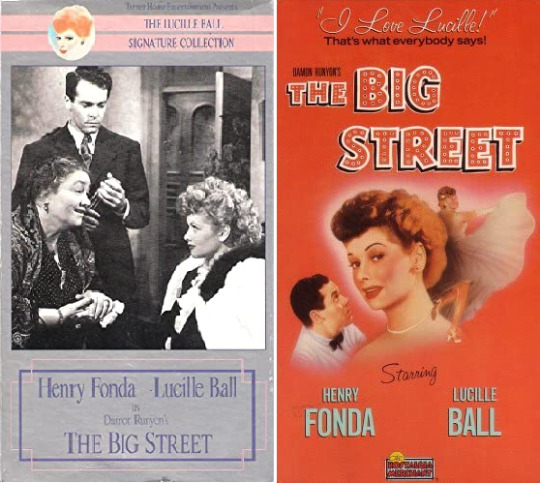
The Big Street on VHS.
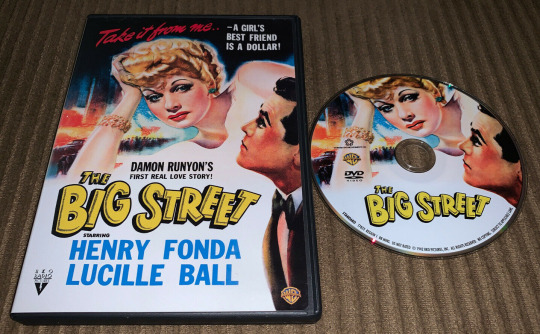
The Big Street is available on DVD from Warner Home Video. It is also part of the Lucille Ball Collection DVD, which also includes Dance, Girl, Dance, DuBarry Was A Lady, Critic’s Choice, and Mame.
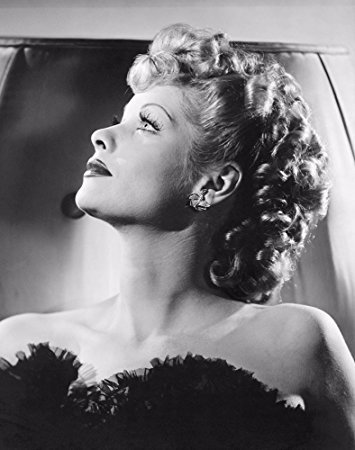
14 notes
·
View notes
Text
Communicating Death & Creating Memory on Fredericksburg's Streets
Communicating Death & Creating Memory on Fredericksburg’s Streets
I have recently had a conference paper accepted on the topic of letters communicating bereavement to those on the Home Front. Since I began my work on the widow’s and dependent pension files, I have become particularly interested in these types of document, and in exploring the multitude of questions we can ask of them. How was news of death transmitted? What degree of detail was provided (or…
View On WordPress
#20th Massachusetts Infantry#Battle of Fredericksburg#Caroline Street Fredericksburg#Fredericksburg Memory#Henry Livermore Abbott#Irish American Civil War#Irish American Memory#Irish in Massachusetts
0 notes
Photo
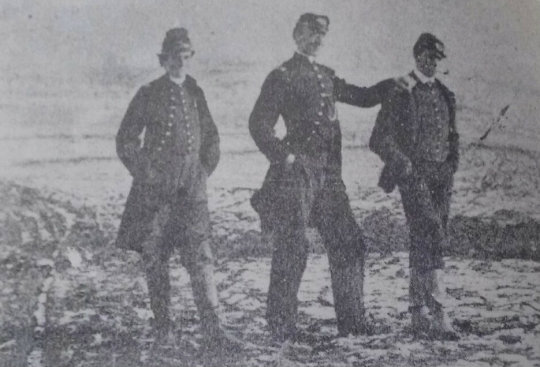
“3 Roughs of the Bloody 20th”, or Massachusetts’ Next Top Model.
George Macy, William “Frank” Bartlett, and Henry Abbott
#historical shitposting#kind of#Henry Livermore Abbott#William Bartlett#George Macy#20th Mass#civil war#these boys....
22 notes
·
View notes
Photo
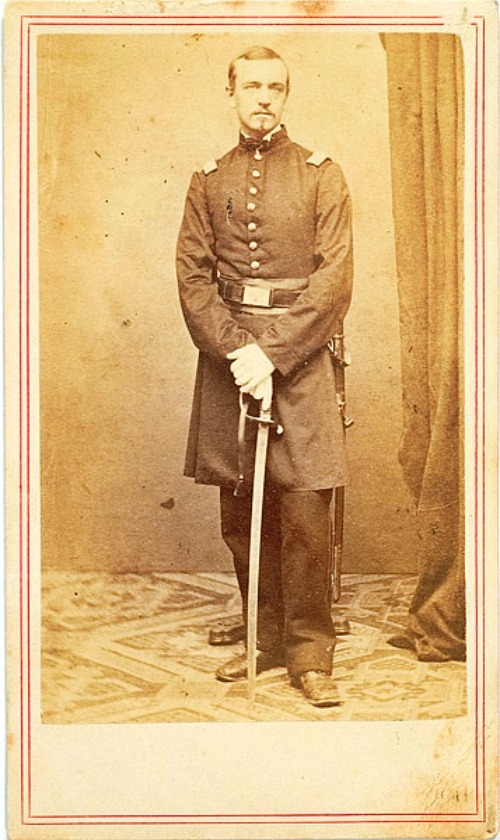
Henry Livermore Abbott - Killed In Action- Abbott was engaged at the center of several key Civil War battles and was widely known and admired for his leadership, courage and composure under fire.
Harvard-educated Abbott was a genuine hero and poignant observer of his times who entered the Civil War lexicon in 1991 with the publication of Fallen Leaves, a collection of his moving war letters. His regiment, the 20th Massachusetts, known as the “Harvard Regiment” was second to none in terms of pure fighting ability and cumulative casualties — the highest of any Bay State regiment — suffered in continuous action with the 2nd Corps, Army of the Potomac.
Abbott joined the army as a 2nd Lieutenant in July 1861 and was mortally wounded on May 6, 1864 while rallying his regiment in the face of an overwhelming attack in the Wilderness. He received a wound at Glendale in June 1862 and took command of the regiment at Gettysburg during the height of Pickett’s Charge for which he was promoted to Major. The popular young soldier’s death at a critical moment in the Wilderness resulted in his special mention in brigade, division and corps after-action reports. Posthumously, Abbott received three brevets including that of Brigadier General in March 1865. Years later Oliver Wendell Holmes still referred to Abbott “as the bright and particular star,” a striking commentary on the level of esteem in which he was held.
http://en.wikipedia.org/wiki/Henry_Livermore_Abbott Source http://www.cowanauctions.com/auctions/item.aspx?ItemId=22075
#henry livermore abbott#civil war#massachusetts#1800's#soldier#cvd#war#battle#oliver wnedell holmes#fallen leaves#harvard regiment#harvard#army
38 notes
·
View notes
Text
hogwarts houses and civil war people lmao
Henry Livermore Abbott is a Slytherin can’t convince me otherwise tbh I mean he was quite snarky towards paul revere’s grandson and honestly i live to hear about it and not only that but he just.. he may not have agreed with war but he was quite amazing in his position and i think thats pretty slytherin of him. He probably is like a slight only tinnnnnny bit of a snob towards gryffindors.
William Francis Bartlett is a Gryffindor He used to party a lot at harvard and he pretty much was an adrenaline-lover. He also was superbly brave and almost lost his life so many different times and still went back to the war.
Thomas Chamberlain is a hufflepuff. He is so extraverted and i tend to put the extraverts and introverts of hufflepuffs as two totally different things just as i do for most houses, and i think hes a extraverted hufflepuff that looks good in a scarf his mom knit him and he probably doesnt study as much as lawrence does but he actually scores well on tests.
Joshua Lawrence Chamberlain is a ravenclaw, rhetoric, knowing like 9 languages, finding education to be important, plus the ravenclaw passcode is a riddle so it’d make sense. Though he is the lion of bowdoin and you’d expect a gryffindor because of that whole idea..i personally think hes a ravenclaw.
Alonzo Cushing is a gryffindor, i think the way he died and how he happened to be at all the major action sums up why i think this.
William Cushing is maybe a slytherin or gryffindor suppose it just depends on how you view him. But he is mischievous and seemed ambitious.. so slytherin?
Oliver Wendell Holmes Jr Is probably a slytherin tbh. Just not a Henry Abbott type slytherin. He is a chill one who sometimes just
Edward Needles Hallowell is a gryffindor he had a strong sense of right and wrong and was a very determined abolitionist just like his brother. These are traits i personally associate with gryffindor!
Robert Gould Shaw Hufflepuff, i remember somewhere hearing that he was not too loud on his opinions but his actions speak for him imo so I tend to lean towards a hufflepuff because i view hufflepuffs as quiet but far more powerful than a gryffindor : which is the perfect example of
#what do you think?#gryffindor#ravenclaw#slytherin#hufflepuff#american civil war#joshua lawrence chamberlain#thomas chamberlain#20th maine#20th massachusetts#alonzo cushing#william cushing#oliver wendell holmes jr#henry livermore abbott#edward needles hallowell
19 notes
·
View notes
Text
Civil War favorites as my spotify shuffle songs
Alonzo Cushing
Hero of the day by Metallica
I thought this was fitting in some way not sure how honestly ??? But i feel the lyric mama represents a youth's point of view. Like the idea of, "cant you hear your baby's crying now" @ the death of cushing just read the lyrics and see if you agree???
William Cushing
Wish you were here by Pink Floyd
Now this comes from a self-reflection hear me out; i am so close to my brother and when he left home this song made me cry. I realized he was no longer with me to talk amd lean on. Now multiply that by the same relationship but death. (Should get you -100 in emotions) Now for Alonzo i pointed out lyrics that truly made me think why it was fitting. So the most fitting song in my opinion would be the lyrics, "we're just two lost souls swimming in a fish bowl year after year" that puts in an idea of living but for what? To see the life you wish not to live? I believe that is how Mr. William felt after the loss of Alonzo.
Joshua Lawrence Chamberlain
Ballad of the 20th Maine by The Ghost of Paul Revere, I mean what was expected it is about the 20th of maine more specifically Andrew Tozier and it mentions little round top and what not.
Thomas Chamberlain
Now Tom, my dear lovely tom I would describe his and blackbird by the beatles. He had the rough childhood that truly shaped him and made many think of him as the younger brother of Joshua and thats really...it.. but he loved being in the army (so it seemed) so as i absolutely love beatles i thought of blackbird and the lyrics, "Take these broken wings and learn to fly, all your life you were waiting for this moment to arise" he was described as brave and the idea of sort of taking what he has and becoming better than what expected really reminds me of blackbird by the beatles
Edward Needles Hallowell
This man. Oh boy do I love a good abolitionist. I cant find a song that describes his personality as I have a lack of knowledge on his personality. So a song that makes me think of him is
Francis William Bartlett
Idk what to give this man so Ill just say what reminds me of him I would like to say something that provides the idea of you will not break me so lets see what I can find- wait I got it have you heard Thief by Imagine dragon well that song has this lyrics in the chorus i believe, listen this is the first time i have heard this song in about 2 years ok, "so take me back when i believe when i was unafraid just like a thief all the heights i could reach just like a thief" i imply this to be good for the idea of him getting wounded, losing a leg and dying the way he did him thinking of his youth when he was still a young adult imo.
Henry Livermore Abbott
Masters of War by Bob Dylan.
Read the lyrics; enough said.
Oliver Wendell Holmes Jr
When we was fab by George Harrison
The idea of looking back at your childhood and thinking of the simplicity reminds me of the memorial day speech by holmes. Lets say Fab describes his friendships formed before the 20th Massachusetts and ended because...till death do us part lol
Robert Gould Shaw
Idk man let me think for a minute or two
I nominate the song fearless by pink floyd
No reason really, i hardly know the lyrics actually I just sort of think of him when i hear it
#alonzo cushing#william cushing#thomas chamberlain#joshua lawrence chamberlain#joshua l chamberlain#tom chamberlain#oliver wendell holmes jr#henry livermore abbott#robert gould shaw#20th mass#20th massachusetts#20th maine#54th massachusetts#edward needles hallowell#william francis bartlett#american civil war#historical shitposting
6 notes
·
View notes
Text
henry abbott but hes nice
#henry abbott#20th massachusetts#henry livermore abbott#civil war#american civil war#20th mass#historical shitposting
1 note
·
View note
Text
Honestly as much as i adore henry livermore abbott
he just seems like someone I wouldn’t get along with due to opinions.
0 notes
Text
Henry Abbott’s... kind... thoughts on Paul J. Revere
May 7, 1863
Paul Revere, I say... finding his place on the staff is filled, goes mousing round the imbeciles at Washington until he gets them to declare that the... regiment is still his & that Macy’s appointment is illegal... & instead of resting content even with that, he writes a letter to Macy, telling him that he should dislike very much to oust so esteemed friend, & accordingly, he will kindly allow Macy to return to his place, while he himself will take the colonelcy.
I tell you he has no more right to it than any civilian there in Boston & that if he sticks to this nasty little technical subterfuge that a gentleman would be ashamed to mention, after getting the letter I have written him expressing the feelings of the officers he will be declared unfit... to associate with gentleman, all but the barest official intercourse will be refused him, &... he will be left... to howl and snarl out ridiculous orders until he gets publicly kicked out for shameful ignorance & inefficiency...
May 17
I can’t meet Revere without feeling sorer & sorer, although the conviction has become general here that his motives are honorable. I can only believe that his feelings have got the better of his judgement... When Revere first came out, I felt terribly tempted to cut off my nose to spite my face, but I flatter myself that I have not imitated him in allowing my feelings to get the better of my judgement. I believe firmly that we shall weather him...
May 18
I can almost wish I were with you. I feel so sick of Hooker as a commander in general & Revere in particular,though to do the latter justice, he hasn’t commanded a single parade or drill since he come to the regiment a week ago. I am bound to believe after the argument we’ve had with him, that he is moved by the most honorable motives, because he says so himself; but it is only another proof to me that the most honorable men may allow his feelings completely to get the better of his judgement, & that brains are necessary as well as instincts, to be really honorable. I think it a defect in Revere’s brain that won’t allow him to change an opinion once entertained.
July 6
All our pique against Revere too had long ceased, since we saw him on the march struggling so nobly with his physical weakness, & he is regretted as such a man should be.
1 note
·
View note
Text
On getting a letter from one of his best friends Norwood Hallowell, who had just accepted a commission as Lt. Colonel of the Massachusetts 54th, this is what Henry Abbott writes:
“The remorsed Hallowell is also in a phrenzy of virtuous & magnanimous indignation, & has written me a letter that I should have expected from any abolitionist except him... I thought at first that he must have been joking, a take off on Putnam’s letter, but since i have made up my mind that he was drunk, as the letter is dated from the Parker House...”
‘Ha ha. He wrote a letter saying that he took command of one of those.... gross regiments but that can’t be true he has to be drunk he would do something stupid like fight for racial equality right? Right, Oliver? Riiiiight?’
#Henry Abbott#was such a racist asshole#but seeing him grapple with actual people who were not racist is fucking hilarious to me#personal post#Henry Livermore Abbott
0 notes
Text
Balls Bluff
Oliver Wendell Holmes Jr was shot through the lungs. The bullet entered through his left side and passed straight on through and out his right. All Wendy could do was stand there, in too much shock to realize what had happened until he was spitting up blood. He couldn’t remember much after that. There was pain, definitely. He couldn’t breathe… he thought he was being rather calm and collected, given the circumstances. He wanted laudanum. He wanted morphine. He wanted anything to take the pain away. He got coffee. How was he drinking? Why did they give him coffee? Was he dying? No… sleeping. He had drifted off. Everything fuzzy. Something wrong. The doctor mentioned dying. Men nearby mentioned dying. How could he not be? Getting shot through the lungs tends to do that to a person. But he didn’t want to die. He was sure he could live if he kept being stubborn. Stubbornness got him everywhere. Maybe he did want to die. Death must be preferable to this. No… live… he has to live…
Henry Abbott managed to find him at the hospital a few hours later. Despite his self assured thoughts, Wendy was not nearly as calm and collected as he imagined himself to be.
“Wendell… Wendell, you need to calm down. Please…”
“Why the fuck should I? I’m dying, aren’t I?”
“Wendell, please… you’re stressing yourself out… stop… you’re not dying…”
“I am dying! And I’ll be god damned if I know where I’m going!”
Henry sighed, petting his hair. “Don’t swear now, ok? I’d rather have you going up than down…”
Wendy whined, gasping for air. “Everything hurts, Henry… just let me die…”
Henry placed a kiss to Wendy’s forehead. “Never.”
Not long after a doctor gave him some morphine, and Wendy finally drifted off into a deep sleep.
A few days later he was on a carriage back to Boston, recovered enough to go home for a few months. Henry saw him off, and wrote him constantly. By the time he got back Henry was a captain. They looked out for each other even more after that.
If one of them was going to die, the other would be right by his side. There was no way they’d ever let each other die alone.
The Wilderness
Henry Livermore Abbott was shot through the lungs. Or maybe it was the stomach. He couldn’t quite be sure, but the effect was still the same. His uniform was starting to turn a sickeningly dark color, and when he coughed he spat up blood. He didn’t have time to think, to feel. His men were almost completely surrounded. He had to get them out of there. He had to… damn it. Before he knew it he was on the ground, gasping and shuddering, confederate snipers targeting him and the other officers. There was smoke everywhere. From the muskets? No… fire. The whole damn forest seemed to be on fire. Had to get out of there… how to get out of there? He was struggling for consciousness now, coughing and wheezing, barking commands to his men. Finally he ordered a retreat, urging them to leave him behind. He was a dead man anyway.
They didn’t listen. Someone picked him up, and the regiment ran, through the burning woods. Through musket fire and artillery and darkness they ran, until they were back on the union lines. Henry was carried off to a hospital, his men watching him worriedly. He was the best commander they ever had. They couldn’t lose him.
Wendy was on another end of the battlefield, an aide to General Sedgewick. All day he was getting reports, passing them along, fighting whenever necessary. All day he was keeping an eye out for any news on the 20th Mass. When it came, it was worse than he had expected. A list of friends- dead. Many more wounded. Then he received a report on Henry. Wounded severely. That’s all it said. No mention of mortal or not. No mention if he was dead or alive.
The doctors did all they could, but Henry Abbott was too far gone. All they could do was give him morphine and let it pass. He was calm, far more calm than he expected himself to be. He ordered everyone out of the tent, after making sure his final will was confirmed. He didn’t scream, he didn’t panic. He accepted what was coming, and he faced it, scared though he was.
Henry Livermore Abbott died, alone. Oliver Wendell Holmes Jr would do the same, 71 years later.
#I wrote this like a year ago lmao but hey I tweaked it here you go#I am Holmes and Abbott trash and this is how it ends I hate myself#Oliver Wendell Holmes Jr#Henry Livermore Abbott#reruns#I suppose
4 notes
·
View notes
Link
I haven’t made a blog post in almost three months oh my goodness gracious. Well, if I am going to get back in the game, might as well go for the sucker punch. Have some doomed Civil War friendships.
1 note
·
View note
Photo

I have to say, the fact that Abbott actually made it to 1864 is nothing short of a miracle...
#I am having Holmes and Abbott feelings someone help me#Henry Livermore Abbott#Oliver Wendell Holmes Jr
3 notes
·
View notes
Quote
It made me think of our visit last year & our [march] across the country, fearing guerrillas & sleeping in the crawling hut of a friend and a brother. That was after all a devilish pleasant journey to look back on. I have felt a sort of brotherhood ever since. However that sort of talk is spooney & I must stop...
Henry Livermore Abbott to Oliver Wendell Holmes Jr, Sept 5, 1863
I really love old Civil War letters, guys. I really love them.
4 notes
·
View notes
Text
So I have a theory involving Oliver Wendell Holmes during the Wilderness campaign. I don’t quite know how to articulate it, but as far as my readings go it has barely been touched upon. The closest I got to it was from “Law and the Inner Self”, which explores how Holmes idealized Henry Abbott after Abbott’s death.
It’s just... fascinating... that for a man that was supposedly Wendy’s best friend, no one ever touches on the fact that Henry Abbott himself- not just his memory- but the living, breathing person, was a huge factor in what made Wendy.... well... Wendy. He wasn’t just an ideal Wendell couldn’t live up to. He was Wendell’s best friend.
And if your best friend dies in a horrific fashion in a horrific war, wouldn’t that effect you? And reading the letters Wendell sends home: how he never, EVER mentions Henry Abbott again in any of his correspondence. How he loses track of where he is or what he’s doing. How he quickly becomes paranoid, how his letters home become frantic and rambly and don’t make any sense whatsoever. It takes ten days for him to realize that every single one of his friends are now dead. He acts recklessly, nearly gets shot to hell by total accident... how he flat out yells and cusses at the President of the United States...
He snapped. He totally and completely snapped.
And I honestly believe Henry Abbott was a bigger factor in it that people give him credit for.
5 notes
·
View notes